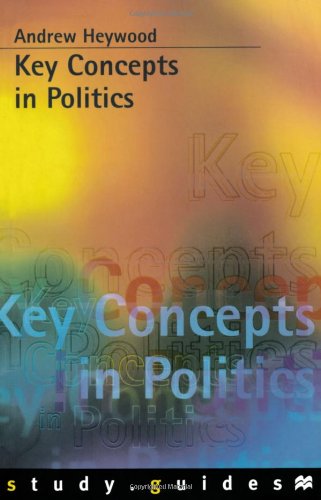Key Concepts in Politics pdf free
Par gordon zenaida le mardi, décembre 22 2015, 23:51 - Lien permanent
Key Concepts in Politics by Andrew Heywood


Download eBook
Key Concepts in Politics Andrew Heywood ebook
Format: chm
Publisher: Palgrave Macmillan
Page: 304
ISBN: 0333770951,
Key concepts include: Political representation of disadvantaged groups is an important means of giving them a voice in the criminal justice system. New APPS: Art, Politics, Philosophy, Science. This concept has been broadly defined as ideological and political leadership based on the consensual dimension of political control (Femia 1987: 25). Society and Sustainable Development – Introduces the learner to the socio-political and ethical issues integral to the study of sustainable development. ANDREW HEYWOOD is Vice Principal, Croydon College, UK, and A-Level Chief Examiner in Government and Politics. I agree wholeheartedly that we tend to take a naive and oversimplistic view of the nature of "self-interest," which is really one of the key concepts of economic, political, and social thought in the Enlightenment tradition. Neglect and delivery are the key concepts of popular political consciousness. Bartlett and Justin Clemens' Alain Badiou: Key Concepts provides a thorough, sophisticated discussion of the French philosopher's work that exceeds the modest suggestion of its title. Indeed, one of the key aspects of the 'conceptual genealogy' approach (as is clear in particular in Nietzsche) is an emphasis on the contingent nature of philosophical concepts as products of long historical traditions. Evidence is consistent with firms using earnings management to reduce both direct political costs and the costs associated with causing embarrassment to affiliated political candidates. A group blog with people from all over the map. For some time TDS has been arguing that there are two key concepts that lie at the root of both political extremism and the climate of violence: The notions of politics as warfare and political opponents as enemies. As an entry into that collection, A.J. He is author of Politics, Political Theory and Key Concepts in Politics. Rather, the post-secular-religious turn in the study of religion can be described as a scholarly attitude that not only is critically engaged with the assumptions and politics of the religio-secularist paradigm but seeks to open up new spaces for the study of religion by self-consciously taking into account the historicity and thus perspectivity that such study The key concept or “critical term” that has guided the work of the contributors to the volume is religion-making. Most of these studies are profoundly flawed—failing, for example, to account for the ways in which key concepts like community, environment, and politics have evolved since the longitudinal surveys were first formulated. Subscribe to this blog's feed . Conclusion: Ideology without End?